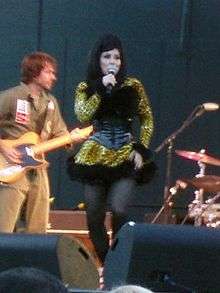Josie Cotton
| Josie Cotton | |
|---|---|
 Josie Cotton performing in June 2007 | |
| Background information | |
| Birth name | Kathleen Josey |
| Born |
1956 (age 59–60) Dallas, Texas, United States |
| Genres | Pop rock, new wave |
| Occupation(s) | Singer, songwriter |
| Website |
josiecotton |
Josie Cotton (born 1956) is an American singer and songwriter, best known for "Johnny Are You Queer?" and "He Could Be the One" from 1982. "Johnny Are You Queer?" was used on the soundtracks to Jackass Number Two and Valley Girl. "He Could Be the One" was used in Valley Girl.
Career
Born Kathleen Josey in Dallas, Texas, Cotton sang with Dallas area bands before moving to Los Angeles, California. She met Larson Paine in Hollywood and the two began dating. Larson and his brother, Bobby, gave her "Johnny, Are You Queer?", previously performed by The Go-Go's, to record as a demo. After the first label to sign her folded, Bomp! Records released the song as a single.[1]
The performance of the single attracted the attention of Elektra Records, which re-released both the single and a full album, with the future Kingdom Come member Johnny B Frank on keyboards, in 1982. The Convertible Music LP has music reminiscent of the 1960s girl group tradition. Cotton made an appearance in the 1983 film Valley Girl, singing "Johnny, Are You Queer?", "He Could Be the One" and "School Is In" during the film's prom scene. In 1984, Elektra issued Cotton's follow-up album, From the Hip, which returned a minor hit with the cover of Looking Glass' "Jimmy Loves Maryann" (with guitar work by Lindsey Buckingham of Fleetwood Mac). In 1986, Cotton appeared in a minor role as the character Silver Ring in the John McTiernan horror film Nomads opposite Adam Ant and Pierce Brosnan. "Johnny, Are You Queer?" was later used in Jackass: Number Two during the "Anaconda Ballpit" stunt. The punk band Screeching Weasel covered the song on their 1994 album, How To Make Enemies And Irritate People.
Cotton recorded Frightened by Nightingales (as Josey Cotton) in 1993. The collection of songs by the songwriter/violinist/self promoter Bill Rhea was released on the French label Silences. Continuing to work behind the scenes, Cotton co-founded B-Girl Records, which issued recordings by Goldenboy and Alaska!. An album of her own music, The Influence of Fear on Salesmen, was planned for release in 2002 on B-Girl but failed to materialize under that title. Cotton released Movie Disaster Music in 2006, followed by Invasion of the B-Girls, composed of B-movie theme song covers, also produced in part by Bill Rhea, in 2007. Building on the critical success of those disks, Cotton released Pussycat Babylon in late 2010. In 2009, "Johnny Are You Queer" ranked at No. 81 on VH1's "Top 100 Greatest One Hit Wonders Of The 80's" list.
Discography
Studio albums
- Convertible Music - 1982, Elektra Records (No. 147, US)
- From the Hip - 1984, Elektra
- Frightened by Nightingales - 1995, Roxco Records
- Movie Disaster Music - 2006, Scruffy
- Invasion of the B-Girls - 2007, Scruffy
- Pussycat Babylon - 2010, Scruffy
Compilations
- Convertible Music/From the Hip (double album CD reissue) - 2002, Collectables Records
Singles
- "Johnny Are You Queer" (Bomp!) (1981)
- "Johnny Are You Queer" (Elektra reissue) (1982) No. 38 Billboard Club Play Singles
- "He Could Be the One" (1982) No. 34 Billboard Mainstream Rock, No. 74 Billboard Pop Singles
- "Jimmy Loves Mary-Anne" (1984) No. 82 Billboard Pop Singles
- "Johnny Are You Queer?" A Date With John Waters (2007)
- "See The New Hong Kong" (2011) Remixes No. 12 Billboard Dance/Club Play 2011[2]
Filmography
- Valley Girl (1983)
- Nomads (1986)
- Jackass Number Two (2006)
- Glee (2011)
References
- ↑ Cotton, Josie (2006). "The Story of '80s New-Wave Hit "Johnny, Are You Queer?"". Magnet. Retrieved July 13, 2014.
- ↑ Profile, Billboard.com; accessed September 16, 2015.